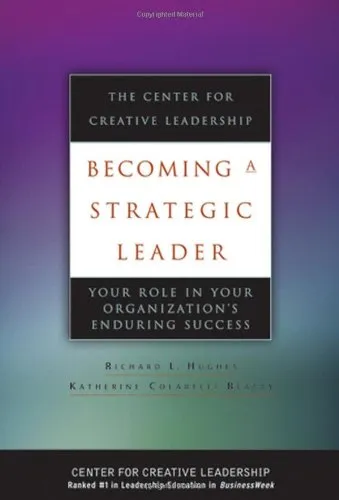Leading Change: A Guide to Whole Systems Working
4.3
بر اساس نظر کاربران

شما میتونید سوالاتتون در باره کتاب رو از هوش مصنوعیش بعد از ورود بپرسید
هر دانلود یا پرسش از هوش مصنوعی 2 امتیاز لازم دارد، برای بدست آوردن امتیاز رایگان، به صفحه ی راهنمای امتیازات سر بزنید و یک سری کار ارزشمند انجام بدینکتاب های مرتبط:
معرفی کتاب
کتاب "Leading Change: A Guide to Whole Systems Working" نوشته مایک پدلر، سو پریچارد، دیوید ویلکینسون و مارگارت اتوود یکی از منابع برجسته و جامع در زمینه مدیریت تغییر و کار با سیستمهای جامع است. این کتاب به تغییر نگرشها، رویهها و فرهنگها در درون سیستمهای سازمانی میپردازد و از رویکردهای مختلف و نوآورانه برای هدایت تغییرات بهره میبرد.
خلاصهای جامع از کتاب
کتاب بر مبنای این باور است که تغییرات در سازمانها تنها زمانی میتوانند مؤثر باشند که به صورت جامع و همزمان در تمامی سطوح و اجزای سیستم اعمال شوند. نویسندگان با ارائه مدلی از Whole Systems Working، به خوانندگان کمک میکنند تا بفهمند چگونه میتوان از ابزارها و تکنیکهای مختلف برای دستیابی به تغییرات پایدار در سازمانها استفاده کرد. مباحثی مانند مفهوم سازی تغییرات، نقش رهبری، مشارکت ذینفعان و اندازهگیری موفقیت تغییرات در این کتاب پوشش داده شدهاند.
نکات کلیدی
- تغییرات باید به صورت جامع و در تمام سطوح سازمانی اعمال شوند.
- نقش رهبری در هدایت تغییرات، نقشی کلیدی و تعیینکننده است.
- مشارکت فعال تمامی اعضا و ذینفعان برای موفقیت فرآیند تغییر ضروری است.
- اندازهگیری و ارزیابی مستمر از اثربخشی تغییرات برای بهبود و دوام آنها لازم است.
جملات معروف از کتاب
"برای ایجاد تغییرات پایدار، نیازمند تفکر سیستماتیک و نگرشی جامع به تمامی اجزای سازمان هستیم."
"همه تغییرات نیازمند رهبری هستند که قادر به ارتباط مؤثر با افراد و اقناع آنان برای پذیرش تغییرات باشد."
چرا این کتاب اهمیت دارد؟
در دنیایی که تغییرات سریع و پیوسته اتفاق میافتند، سازمانها برای بقا و پیشرفت نیازمند توانایی تطبیق و تغییر هستند. این کتاب به مدیران و رهبران ابزارهای لازم را برای مدیریتی مؤثر در این جهت ارائه میدهد و آنها را قادر میسازد تا تغییراتی پایدار و مثبت در سازمان ایجاد کنند. با داشتن رویکردی کاربردی و عملی، کتابی ضروری برای هر کسی است که به دنبال بهبود فرآیندها و رویههای سازمانی است.
Welcome to the comprehensive guide to 'Leading Change: A Guide to Whole Systems Working', a pivotal literary work that is designed to empower leaders and change-makers with the frameworks and methodologies necessary for effective systemic change. Crafted by a collaborative team of authors, Mike Pedler, Sue Pritchard, David Wilkinson, and Margaret Attwood, this book delves into the intricacies of navigating and leading transformation across various kinds of organizations.
Detailed Summary of the Book
In an era characterized by rapid technological advancement, global interconnectedness, and increasing complexity, 'Leading Change: A Guide to Whole Systems Working' serves as a comprehensive resource for leaders striving to foster change through a systems-thinking approach. The book begins by outlining the need for a systemic perspective in today's multifaceted organizational landscapes. It builds upon essential theories and practices of whole systems thinking, enabling leaders to view their organizations as interconnected systems where each component is interdependent.
The authors guide readers through several key methodologies, including action learning, participatory leadership, and reflective practices. These strategies are not only explained but are accompanied by real-world examples and case studies, offering practical insights into successful application. Additionally, the book introduces readers to the notion of the learning organization—an entity that thrives on adapting and evolving alongside emergent changes. By fostering such an environment, leaders can create robust frameworks that support sustainable innovation and collaboration.
Key Takeaways
- Systems Thinking: Gain a comprehensive understanding of how systems thinking can transform leadership and problem-solving.
- Action Learning: Learn how iterative learning processes help teams to tackle challenges effectively.
- Participatory Leadership: Explore methods for engaging various stakeholders in the decision-making and change processes.
- Reflection and Adaptation: Discover the importance of reflection in fostering adaptive leadership practices.
- Case Studies: Benefit from a rich selection of real-world examples that illustrate the practical application of whole systems thinking.
Famous Quotes from the Book
"In the dynamic landscape of today's organizations, the greatest leaders are those who view change not as a threat, but as an opportunity for systemic growth."
"A learning organization is not afraid of failure; it embraces failure as an integral part of the learning journey."
Why This Book Matters
Amidst increasingly complex challenges faced by modern organizations, 'Leading Change: A Guide to Whole Systems Working' stands out as a beacon for innovative leadership. As businesses and institutions navigate the unpredictable waters of globalization, climate change, and technological disruption, the principles outlined in this book offer invaluable guidance. It is not just another leadership manual; it is a call to embrace a mindset that fosters resilience, collaboration, and sustainable growth.
The book's contribution to the discourse on organizational change is profound. It bridges the gap between conventional leadership theories and the practical demands of today's world, offering leaders a toolkit to drive transformative change. By understanding the interconnected nature of systems, readers can effectively address root causes rather than symptoms, and cultivate an environment that adapts in response to internal and external pressures.
Ultimately, 'Leading Change: A Guide to Whole Systems Working' matters because it equips leaders with the knowledge and skills to navigate the complexities of their environments, ensuring not just their survival, but their flourishing. It is a must-read for anyone committed to harnessing the power of systemic change to make a lasting impact in their organization and beyond.
دانلود رایگان مستقیم
شما میتونید سوالاتتون در باره کتاب رو از هوش مصنوعیش بعد از ورود بپرسید
دسترسی به کتابها از طریق پلتفرمهای قانونی و کتابخانههای عمومی نه تنها از حقوق نویسندگان و ناشران حمایت میکند، بلکه به پایداری فرهنگ کتابخوانی نیز کمک میرساند. پیش از دانلود، لحظهای به بررسی این گزینهها فکر کنید.
این کتاب رو در پلتفرم های دیگه ببینید
WorldCat به شما کمک میکنه تا کتاب ها رو در کتابخانه های سراسر دنیا پیدا کنید
امتیازها، نظرات تخصصی و صحبت ها درباره کتاب را در Goodreads ببینید
کتابهای کمیاب یا دست دوم را در AbeBooks پیدا کنید و بخرید
1432
بازدید4.3
امتیاز0
نظر98%
رضایتنظرات:
4.3
بر اساس 0 نظر کاربران
Questions & Answers
Ask questions about this book or help others by answering
No questions yet. Be the first to ask!














